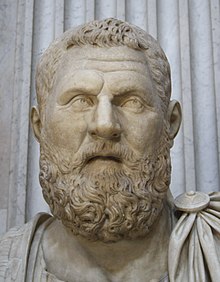Gaius Fulvius Plautianus
| Gaius Fulvius Plautianus | |
|---|---|

Plautianus
|
|
| Born | Leptis Magna, Africa Province |
| Died | 205 Rome |
| Allegiance | Roman Empire |
| Years of service | 197–205 |
| Rank | Praetorian prefect |
| Unit | Praetorian Guard |
| Other work | Consul of the Roman Empire in 203 |
Gaius or Lucius Fulvius Plautianus (c. 150 – 22 January 205) was a member of the Roman gens Fulvia (the Fulvius family).
Plautianus was originally from Leptis Magna, southeast of Carthage (modern Libya, North Africa). He was a maternal cousin and long-time friend of Roman Emperor Lucius Septimius Severus. Plautianus' father was another Gaius Fulvius Plautianus, born c. 130, whose sister, Fulvia Pia (c. 125 - after 198), was married to Severus' father Publius Septimius Geta.
Plautianus was Praefectus vigilum (commander of the Vigiles in Rome) from 193 to 197.
Plautianus was appointed praetorian prefect of the Praetorian Guard in 197. Due to their friendship, Severus rewarded Plautianus with various honors, including a consular insignia, a seat in the Roman Senate and the Consulship of 203. During his consulship, Plautianus' image was minted on coins along with Severus' second son Publius Septimius Geta.
He assisted Severus in administering the empire and became very wealthy and powerful. Severus made him his second in command. In 202, Plautianus married his daughter Publia Fulvia Plautilla to Caracalla (Severus’ first son) in Rome. Plautianus became so powerful that Roman Empress Julia Domna and Caracalla began to be concerned.
The marriage between Caracalla and Publia Fulvia Plautilla was not a happy one. In fact, Caracalla loathed both her and her father, threatening to kill them after becoming sole emperor. When Plautianus discovered this, he plotted to overthrow Severus' family.
When Plautianus' treachery was discovered, the imperial family summoned him to the palace and ordered his death on 22 January 205. After his death, Plautianus’ property was confiscated, his son of the same name, daughter and granddaughter were exiled to Sicily and then later to Lipari and his name was erased from public monuments. His son, daughter and granddaughter were strangled on Caracalla's orders in early 212.
...
Wikipedia
